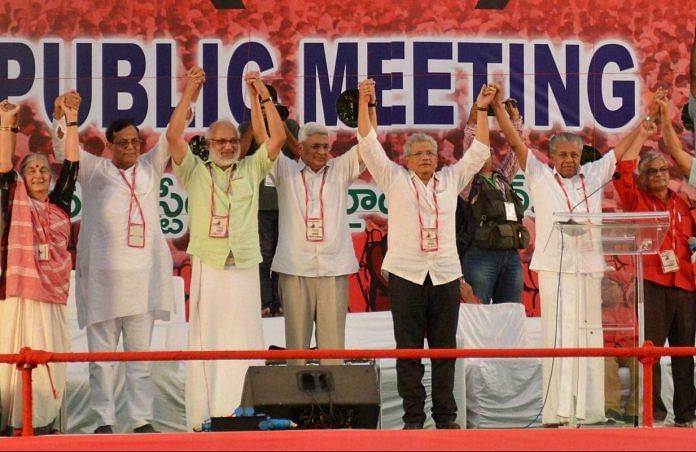With 9 Lok Sabha seats and a government in just one state, it is baffling how the CPI(M) could spend so much time on one-upmanship instead of reviving itself.
New Delhi: For three days of its five-day Party Congress in Hyderabad, and for three months preceding that, the Communist Party of India (Marxist) spent all its time squabbling and politicking over one word in its political resolution. The question was whether to adopt general secretary Sitaram Yechury’s line and allow an ‘understanding’ with the Congress, or to follow his predecessor Prakash Karat’s line and rule out any ‘understanding’ whatsoever.
Eventually, though the Karat camp lost, it was the party that was the real loser. At a time when it has a dismal nine seats in the Lok Sabha, down from 44 just two elections ago in 2004, and is in power in just one of the 29 states, it is baffling how it could spend so much time in internal games of one-upmanship instead of focusing on its revival as it desperately gasps for breath.
Directionless and disconnected
It is equally odd that the party believes its understanding with another party is so crucial to national political fortunes. Realistically, what would the Congress even gain by allying with the CPI(M), given its fast dwindling electoral presence? The party has no base in the northern, central or western parts of the country at all. In West Bengal, Mamata Banerjee’s Trinamool Congress has raced past it and the Congress would be better off allying with her. It is only in Kerala that the CPI(M) has a presence, but a pact with the Congress would be odd, considering the two are each other’s main rivals.
The party has witnessed a rapid decline, and reached a level of electoral irrelevance it would find it hard to recover from. It seems directionless, disconnected and has little resonance among the youth. The party has remained anachronistic, failing to adapt itself to altered socio-politics of this country and appeal to the new-age voter. In its bastions, the party is but a pale shadow of itself.
In West Bengal, the CPI(M)-led Left Front faced a humiliating defeat in the 2016 assembly polls, with the Trinamool Congress winning 211 of the 294 seats, and hasn’t been able to recover since. In the Left-Congress alliance, the Congress in fact did better than the CPI(M).
Its government in Kerala, led by Pinarayi Vijayan, is fraught with troubles and controversies. Its age-old stronghold Tripura was decisively snatched away by the BJP in March.
Nationally, the CPI(M) is more irrelevant than it has been in three decades. It is ironic that the party, in its big meeting last week, constantly referred to its main agenda being the defeat of the BJP and the RSS, instead of talking about its own resurrection.
A symbolic presence
Relevance for a political party, however, is both electoral and political. Despite its near-complete electoral irrelevance, the Left – especially the CPI(M) – remains a politically relevant force, and an important voice in Parliament. Let’s not forget it was Yechury who first talked about impeachment of the Chief Justice of India, and even though he was mocked by sections then, the opposition did end up moving the motion.
According to sources in the Congress, it was Yechury who primarily drove the initial agenda and held meetings with Congress vice-president Rahul Gandhi to push for the impeachment.
It is also true that the CPI(M) is symbolically an important part of the larger opposition umbrella. Yechury is invited for all key opposition meets, including by former Congress president Sonia Gandhi, and the party’s views are given due importance. There is also little doubt that Left politics is as important as other streams of politics for a balanced polity.
It is the CPI(M)’s politically symbolic presence that is still keeping it relevant. In politics, however, nothing matters more than winning elections, and if the party does nothing to arrest its slide in this direction, whatever is left of its political clout will also evaporate.
Instead of channeling all its energies in debating the ‘minority’ versus ‘majority’ views within the party, the CPI(M) would do well to acknowledge that it is now a minority force in national politics, and that it needs to do all it can to reverse that.
Hope for the future?
CPI(M) politburo member Mohammed Salim dismissed the notion that the party was a divided house, and expressed hope for the future.
“The best thing is that the challenges have been identified. We have emerged as a more united party, ready to take on the challenges collectively with a new zeal. We proved all ‘experts’ wrong. There are no differences in the party, only diverse views,” Salim said.
However, Prasenjit Bose, Left economist and a former convenor of the CPI(M)’s research unit, disagreed with Salim, foreseeing a much more bleak outlook. “The Party Congress outcome does not provide any roadmap for the CPI(M)’s revival in its strongholds. The inner party rift will not subside; the Left’s decline is unlikely to be reversed,” Bose said.



